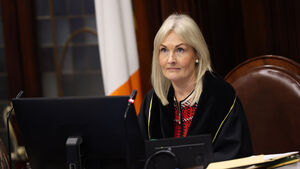Fallon's Town Talk: FF and FG could come to regret not doing deal with II

Ceann Comhairle Verona Murphy. Photograph: Oireachtas Press Office via RollingNews.ie
Economics was once described as “the dismal science”. You won’t be surprised to hear that George Lee was once, long, long ago, an economics lecturer in what is now Galway University. I know because I was one of his students for a brief time.
Economists seem to specialise in expecting the worst. That’s why business people, entrepreneurs and politicians often treat their forecasts with scepticism. However, their advice isn’t always wrong. Hence, one economist’s ominous warning that Ireland is this week facing, potentially, its greatest economic crisis since the Economic Crash of 2008 has caused alarm.
Tomorrow (Wednesday) has been dubbed ‘Liberation Day’ by President Donald Trump. To the rest of the world, tomorrow is the day when a tariff war is set to start between the US and many of its former allies. Ireland is particularly exposed to a trade war between the US and the EU, especially our pharmaceutical, food and drink industries.
Last week the Minister for Finance, Paschal Donohue, was one of the few leading Irish politicians who seemed to be concentrating on the coming economic storm. Donohue has made a career out of not making rash statements to the media. That’s why his obvious anxiety when appearing on ‘Prime Time’ last Thursday was more concerning than any doom-laden forecast from an economist.
If the worst predictions come to pass, future generations will look at this watershed in our history and wonder how urgently and decisively our leaders acted.
They will be flabbergasted to discover the Dáil was embroiled in a row over speaking rights and even more astounded to learn that the national parliament barely did any business from the general election on November 29th, 2024 to April Fool’s Day, 2005 when a confidence motion in the Ceann Comhairle was debated. The significance of the date of the motion will seem apt but not funny.
Those future generations should at least know that the Irish public in 2025 is enraged by the shenanigans of the nation’s politicians. Initially, the public was on the side of the opposition parties following their furious reaction to a bizarre deal cobbled together by Fianna Fáil, Fine Gael and the Regional Independents.
The two big parties formed a coalition government with four of the seven independents getting plum jobs, along with one of the Healy Rae brothers. The attempt of the other independent deputies to get speaking rights from the opposition benches was baffling.
The strangest part of the controversy is that Micheál Martin and Simon Harris didn’t dismiss the idea, especially when the initial furore blew up. The credibility of the Taoiseach, in particular, has been damaged.
There must have been times over the last few, fraught weeks when Martin and Harris have regretted not doing a coalition deal with Independent Ireland. Their four deputies along with the Healy-Rae brothers would still have given FF and FG a comfortable majority, especially as other conservative independents would probably have backed the government on crunch Dáil votes.
In the immediate aftermath of the election, the word was that the two major coalition parties saw the Regional Independent Group as more reliable partners than II. That looks suspect now, especially as they wouldn't have needed to concede as many junior ministers or the now-notorious super junior posts to satisfy the smaller party.
One area in which the opposition parties have succeeded is in renaming the artists formerly known as ‘The Regional Independents’ as ‘The Michael Lowry Independents’. The moniker has stuck and is in widespread use. That creates an image problem for the government that could last.
However, as the row has dragged on, people have lost whatever little interest they had in Dáil speaking rights. Their attitude now is, to borrow a phrase from Shakespeare, “a plague on both your houses”.
The Irish public is increasingly worried about the threat of a trade war and its impact on our economy. The White House administration has made it clear it is coming after the profits from US multinationals based in Ireland – the corporation tax bonanza that underpins our government’s cornerstone capital projects. People also look at Trump’s erratic behaviour toward Ukraine and the EU and wonder about the implications for Irish defence and security.
Meanwhile, the ongoing major issues of the day such as housing, health and inflation – fertile areas for the opposition parties to confront the coalition – are ignored. Unless politicians on both sides of the aisle in Dáil Éireann get their act together quickly, voters will be slow to forgive and forget.





